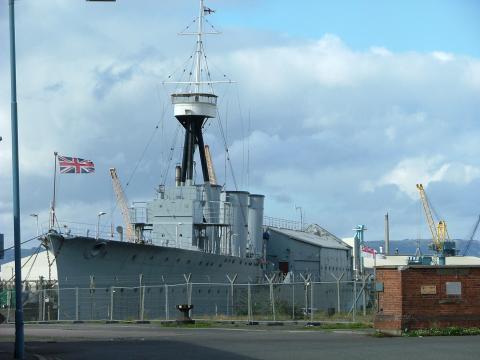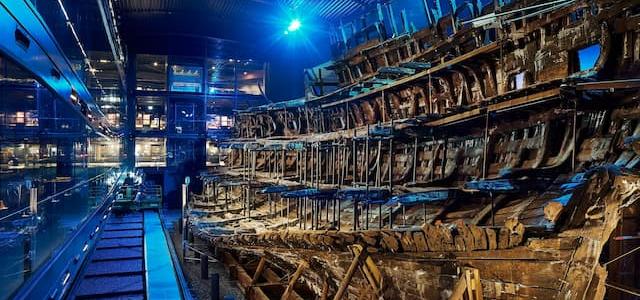
HMS Caroline, the last surviving First World War ship, receives £1m lifeline from NHMF
HMS Caroline, one of the most historically significant war ships in the world whose future was threatened through deterioration and neglect is to be secured thanks to a £1million from the National Heritage Memorial Fund (NHMF).

This vital grant awarded the National Museum of the Royal Navy (NMRN) will now enable urgent repair works that will prevent further decay to the Belfast-based light cruiser whilst plans are finalised for its long-term future in the city. Works will include making the ship wind and water tight and incorporate the removal of dangerous asbestos while the ship is in situ and afloat.
Professor Dominic Tweddle, Director General of the NMRN, welcomed the announcement and says a vital piece of 20th-century European history had been saved for future generations. "We cannot overestimate the significance of HMS Caroline," says Professor Tweddle. "It is the only remaining floating survivor of World War One. NMRN is thrilled that the funding is now in place to secure it and prevent any further deterioration."
Jenny Abramsky, Chair of the NHMF, says: "As we approach the centenary of the First World War, the National Heritage Memorial Fund's role to protect our most important heritage at risk as a permanent memorial to those who have given their lives for this country has never felt so pertinent. Without question, our trustees felt it was absolutely vital that as an icon of this devastating war, HMS Caroline must be safeguarded."
Northern Ireland's Minister for the Economy, Trade and Investment, Arlene Foster says the funding marks the beginning of a two-stage rescue plan.
Arlene Foster comments: "The second stage will be driven by a funding application to the Heritage Lottery Fund to restore and preserve HMS Caroline. Our ultimate aim is to transform the ship into a world-class floating museum in time for the Battle of Jutland centenary in 2016, as I believe HMS Caroline has huge potential as a visitor experience."
NMRN's Caroline Project Director Captain John Rees says work can now start on repairs to prevent further wind and water ingress.
"We will be seeking to repair upper deck drainage (scuppers), replace perished seals on hatches and doors, remove and refurbish portholes, repair the leaking funnel deck and lift areas of rotting deck and repair," says Captain Rees. "Other essential work will include inspections of internal tanks and coffer dams, cleaning and repairing where leaks are found and the necessary asbestos remediation to enable this work."
Built in Merseyside in 1914, HMS Caroline is the last survivor of the Battle of Jutland, the First World War's longest, most strategically important sea battle and the only time the full German and British navies engaged directly. A light cruiser, weighing 3,750 tons and 446ft long, when built she was technologically ground-breaking. It was her maximum speed of close to 30 knots that enabled the British Navy to respond to the increasing threat of long range torpedo attack on battleships, locating the enemy fleet and then rapidly carry news back to the British battleships.
When the war ended she became a static training ship based in Belfast. During the Second World War, HMS Caroline was back in action, acting as a key base for operations to protect the North Atlantic convoys from U-boat attacks. In 1945 she returned to her role as a static drill ship in Belfast until decommissioned in 2011, making her the longest ship in commission in the British Navy after HMS Victory.
The most significant war ship of the 20th century, HMS Caroline is one of only 200 vessels in the National Historic Fleet. What is even more significant about her is that she is barely unchanged from the day she was constructed and is 80 per cent complete.
"The Ministry of Defence gifted the ship to NMRN on the understanding that it would be transformed into a museum with conference and meeting spaces. NMRN says it is important that the Caroline becomes a compelling and fascinating attraction but also provides a sense of inclusivity and shared space in which all Northern Ireland communities as well as visitors will feel welcome," says Professor Tweddle.
An urgent funding application to NHMF was made earlier this year by the NMRN in a bid to rescue the HMS Caroline. In September, NHMF pledged £1million in order to underpin the partnership between the NMRN, Ministry of Defence (MOD) and the Department of Enterprise, Trade and Investment (DETI) in Northern Ireland to create a plan for the future for HMS Caroline.
Notes to editors
Centenary of First World War – Earlier this year, Prime Minister David Cameron today set out the Government's plans to mark the centenary of the start of the First World War in 2014. As part of this announcement the Government also announced NHMF's pledge of £1m to secure HMS Caroline. Wider centenary plans include a £35m refurbishment of the WWI galleries at the Imperial War Museum (IWM); a project made possible due to an extra £5m from the Treasury announced today. The Government’s principal partners in the commemorations will be the Commonwealth War Graves Commission, the Heritage Lottery Fund and the IWM, but will encompass support for a multitude of other initiatives, large and small, as they come together in the months and years to come.
Further information
NMRN, JPR Belfast: Joris Minne, email: joris.minne@jprni.com.
National Heritage Memorial Fund: Natasha Ley, email:NatashaL@hlf.org.uk.
DETI Press Office: Karen Fullerton, email: Karen.fullerton@detini.gov.uk

